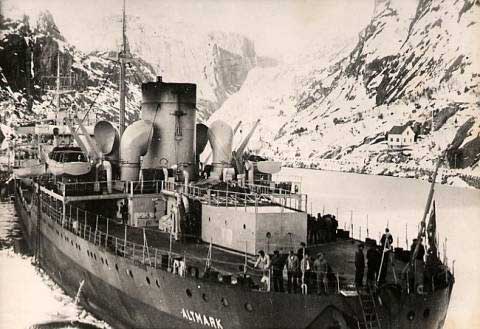Friday 16 February 1940
 |
| The Altmark in Norway. |
Winter War Army Operations: The Finns admit in a communique that the Soviets have breached the Mannerheim Line in three places: east of Summa, and two between Muola Lake and Vuoksi River. This, of course, does not include the critical fact that the entire line now is in retreat to the V-Line.
The order to retreat came late on the 15th, and the units under the most pressure executed it immediately. Some units in better shape don't receive the order until this afternoon.
Finnish 9th Infantry Division, including Group Talvela, wipes out the remnants of the Siberian ski brigade "Dolin." There are 70 survivors of the unit out of the 1,800 skiers who initially crossed the frontier. The Siberians are/were well-equipped with automatic weapons, which the Finns can use.
Winter War Air Operations: The Finns bomb Soviet railway stations and tracks behind the lines. They also claim to have shot down 8 more Soviet planes.
Special Ops: Having spotted the Altmark a few days ago, the Admiralty, i.e., Winston Churchill, acts fast. It instructs the HMS Cossack to violate Norwegian neutrality and enter its territorial waters for the purposes of boarding the supply ship. The Altmark, crowded with 299 British prisoners from the ships sunk by the Admiral Graf Spee in the South Atlantic, believes that it is safe, but it is not.
Located in Joessing Fjord, Southwest Norway, Admiral Vian menaces the Altmark at around 22:00, which then runs aground. A British boarding party kills seven German sailors, wounds 11, and releases the prisoners from the hold. Captain Philip Vian becomes a national hero for this, and the incident enters British naval lore for truths, half-truths, and unproven and unlikely legends about the affair (such as that the boarding party actually used cutlasses, like pirates, to free the men).
The Norwegian escort - a torpedo boat - watches the whole affair but does not intervene. Technically, the prisoners should have been released upon entering neutral waters, so the Norwegian involvement is equivocal, but the Germans never notified them of the prisoners. This, actually, is something the British have done as well, such as when a British ship passed through the US Panama Canal with German prisoners, so they have no cause to complain, and don't. The Cossack leaves the Jøssingfjord just after midnight on 17 February with the 299 prisoners.
While the fate of the 299 sailors is important, so is the larger course of the war. The Germans observe the high-handed British attitude to Norwegian neutrality and speed up their own plans regarding the country. Naturally, the Germans make the dead into martyrs.
Battle of the Atlantic: U-14 (Oberleutnant zur See Herbert Wohlfarth) has a big day northeast of Scotland. They are all carrying coal from Britain to Denmark and Sweden.
First, around midnight, U-14 torpedoes and sinks 1,064-ton Danish freighter Rhone. There are 11 survivors, 9 perish.
Second, it torpedoes and sinks the 1,066-ton Danish freighter Sleipner. There are 28 survivors and 13 perish. The Sleipner had stopped to help the people from the Rhone.
Third, at 21:25, U-14 sinks the 1,526-ton Swedish freighter Osmed. There are 7 survivors and 13 perish.
Fourth, about ten minutes later, U-14 sinks 1,646-ton Swedish freighter Liana. There are eight survivors, 10 perish. The area is full of passing freighters and trawlers, so the survivors all get picked up fairly quickly.
The British authorities at Gibraltar detain the US freighter Excalibur for a few hours, then let it and the freighter Exermont, which has been detained since 14 February, proceed.
Convoy OA 93 GF departs from Southend. Convoy HX 20 departs from Halifax.
Royal Air Force: Royal Air Force Hurricanes and Spitfires are converting over to 100 octane fuel. This gives them a performance boost by increasing engine power by raising the boost to +12 lb/sq.in. Every little bit helps against the equally matched Bf 109s, though the Bf 109s as yet cannot make it to Great Britain. No. 602's Operations Record Book notes today that "100 octane fuel now in all aircraft."
Anglo/Soviet Relations: Sir Stafford Cripps, a well-known Marxist sympathizer who plays that role well in the British government, meets with Soviet Foreign Minister Molotov. This is a fascinating example of the British minding their diplomatic fences. On the one hand, they are openly supporting the Finns in their fight against the Soviets, but on the other, they are secretly attempting to learn if there is any room for accommodation with the Soviets.
British Homefront: The British authorities stage a crackdown on "steakeasies" (like "speakeasies" during Prohibition) which are unauthorized slaughterhouses circumventing the rationing process.
 |
| Flag-draped coffins containing German dead are brought ashore for burial after the Altmark Incident in Jossingfjord, Norway. |
February 1940
February 3, 1940: Soviets Capture a BunkerFebruary 4, 1940: Peace Talks in Stockholm
February 5, 1940: Allies to Invade Norway
February 6, 1940: Careless Talk Costs Lives
February 7, 1940: IRA Terrorists Executed
February 8, 1940: Spies!
February 9, 1940: The Welles Mission
February 10, 1940: Confiscation of Jewish Goods
February 11, 1940: Soviets Attack Mannerheim Line
February 12, 1940: Breaches In Mannerheim Line
February 13, 1940: Soviets Inching Forward in Finland
February 14, 1940: Soviets Batter Mannerheim Line
February 15, 1940: Finns Retreat
February 16, 1940: Altmark Incident
February 17, 1940: Manstein and Hitler Discuss Fall Gelb
February 18, 1940: Operation Nordmark
February 19, 1940: King Gustav Says No
February 20, 1940: Falkenhorst Commands Weserubung
February 21, 1940: Radar Advances
February 22, 1940: Friendly Fire
February 23, 1940: Soviets Present Their Demands
February 24, 1940: Fall Gelb Revised
February 25, 1940: Mr. Welles Comes to Visit
February 26, 1940: Battle of Honkaniemi
February 27, 1940: Finns Retreat Again
February 28, 1940: Overseas Volunteers Help Finland
February 29, 1940: Finns Accept Soviet Terms In Principle
2019
No comments:
Post a Comment